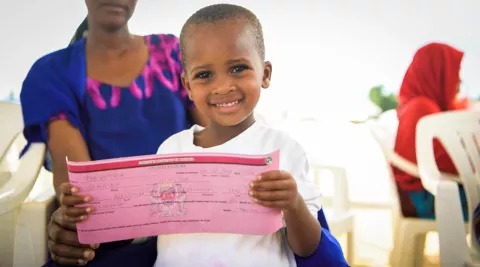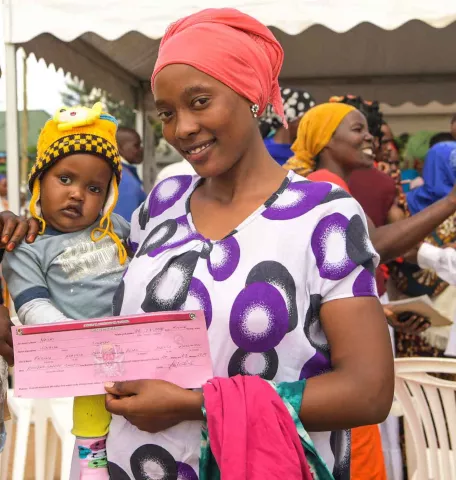UNICEF and SADC call for action against gender-based violence
New report calls for improved legislation, policies, and budgets to address gender-based violence
UNICEF and SADC call for improved legislation, policies, and budgets to address gender-based violence as data reveals that about 17 per cent of girls and women in Southern Africa have experienced forced sex in their lifetime.
28 per cent of women in Tanzania have experienced sexual abuse during childhood.
Gaborone/Nairobi, 23 November 2023 – The prevalence of sexual, physical and emotional violence in several Southern African countries is among the highest in the world, according to a new report by UNICEF and the Southern African Development Community (SADC). Across the region, an average of 17 per cent of girls and women experience forced sex in their lifetime and 80 per cent of children experience violent discipline at home in Southern Africa. Women are significantly more likely to report childhood experiences of sexual abuse (28 per cent) compared to men (18 per cent).
This report compiles a statistical profile of the prevalence of violence against children and women in Southern Africa and found this violence to be pervasive and persistent, affecting millions of lives.
The mortality rate from homicide among children, adolescents, girls and women in the SADC region was nearly double the average for the rest of the world. Child marriage is also prevalent in Southern Africa, with 30 per cent of young women married before the age of 18. Among these young brides, nearly a third (31 per cent) have experienced some form of intimate partner violence in the past year and across the region. In Tanzania, the most likely perpetrators of forced sex against girls and women are usually intimate partners (current husband/partner 42 per cent; former husband/partner 33 per cent; or current/former boyfriend 11 per cent) and friends (12 per cent).
This violence takes many forms, including physical, sexual and emotional violence along with neglect and exploitation. Violence is often hidden, under-reported and perpetuated by harmful social norms, gender inequality, poverty, conflict and other structural factors, destroying not only individual lives but also threatening national economies, mental health and educational outcomes.
The regional statistical profile further highlights that:
-
One in three girls and women have experienced some form of violence by a partner in the past year. More than half of girls and women who experienced violence never sought help. In Tanzania, 38 per cent of girls and women have experienced some form of violence by a partner in the past year, and a third of those who experienced the violence never sought help, 11 per cent told someone but never sought help, and only 54 per cent sought help related to the experienced violence.
-
40 per cent of adolescent students have experienced bullying, and girls and boys are equally likely to be victimized across the region. Tanzania is below the regional average at 27 per cent with a similarly equal experience between girls and boys.
-
The risk of boys dying from homicide is over three times higher than that of girls. Alarmingly, more than half of the children and adolescents who died from homicide were between the ages of 15 and 19.
Across most countries, at least one in five children live with a mother who has experienced intimate partner violence in the past year. Children living in households affected by intimate partner violence are significantly more likely to experience all types of violent discipline.
Not only is violence often intergenerational, it is also deeply embedded in the attitudes of women and men. In fact, girls and women in most countries are more likely to justify wife-beating than boys and men and there is a significant association between mothers’ attitudes justifying wife beating and children’s experience of violent discipline - and this finding is not influenced by other factors such as wealth.
UNICEF and SADC call on SADC Member States to strengthen legislation, policies, budgets, and accountability to protect women and children against this violence. This includes updating and aligning laws with international and regional standards and ensuring core violence prevention and response interventions are costed and incorporated into national budgets.
Etleva Kadilli, UNICEF Regional Director for Eastern and Southern Africa, said:
“The root causes of violence against children and women are grounded in power imbalances. Abuse of power occurs along the dimensions of both age and gender. Poverty, unemployment, weak legal frameworks, armed conflict, and humanitarian crises also exacerbate this high prevalence of violence throughout Southern African countries. Violence against women and children is often normalized, and in many cases becomes intergenerational. We must break this vicious cycle of violence.”
His Excellency Mr Elias Magosi, the Executive Secretary of SADC said:
“It is unacceptable that millions of girls, boys and women are still being held back, injured or killed by violent perpetrators. Violence and abuse against children and women is harmful to society’s development and for this reason, we have prioritised prevention of gender-based violence as a key intervention in our SADC Regional Indicative Strategic Development Plan for 2022-2030. We are also intensifying our implementation of the SADC Regional Strategy and Framework of Action for Addressing Gender-Based Violence Strategy to operationalise the GBV provisions in the SADC Protocol on Gender and Development.”
The report highlights that violence against children has both immediate and long-term effects, not just on the individual survivor but on society as whole. Immediate physical effects include death, injury, sexually transmitted infections and unwanted pregnancies, which can in turn lead to longer term physical effects such as PTSD or high blood pressure. Mental health impacts often include depression, anxiety and even suicidal thoughts. These physical impacts also directly reduce educational outcomes. Children who have experienced violence have been found to perform worse than children who have not, on verbal, memory, attention, language, mathematics and IQ tests. Adults with a history of physical or sexual abuse as children were found to have lower levels of education, employment, and earnings than their peers. They are more likely to engage in risky behaviours such as excessive drinking, drug use or minimising condom use.
UNICEF and SADC member states continue to seek an end to violence against girls, boys and women by prioritising prevention, response and ensuring no one is left behind:
-
Prevention: Scaling up gender-transformative initiatives to support parents and caregivers and create more gender-equitable household structures; ensuring schools are ‘Safe to Learn’ by adopting policies and systems that protect children; and including measures to protect children from online violence.
-
Response: This includes referral pathways and child-friendly spaces for reporting violence and improving support services. Social workers dealing with domestic violence and child protection must ensure the well-being of entire households; and frontline support to survivors must be strengthened by providing mental health and psychosocial support, legal aid, medical care and protection services.
-
Leaving no one behind: Supporting initiatives that empower women and girls, especially the most marginalized. UNICEF is working with SADC Member States and partners in promoting girls’ access to education and other life opportunities. There are also ongoing interventions addressing harmful practices such as child marriage and female genital mutilation, with the aim of reducing the risk of violence against women and girls. Relevant partners are engaged during humanitarian settings characterised by armed conflict, natural disasters, or public health emergencies.
--END--
NOTE TO EDITORS:
About the methodology
The data presented in this publication are from the most recently available and comparable sources identified for each country. Regional aggregates are only presented when the available country data cover at least 50 per cent of the relevant regional population. Where this was not possible, weighted averages of the available country data are presented. Collecting reliable data on violence against children and women is a complex undertaking that raises considerable methodological challenges and ethical issues. When interpreting these data, the recommended approach is to exercise caution and assume that figures underestimate the actual number of children and women affected.
About SADC
SADC is an organisation of 16 Member States established in 1980 as the Southern African Development Coordinating Conference (SADCC) and later, in August,1992 transformed into the Southern African Development Community (SADC). The mission of SADC is to promote sustainable and equitable economic growth and socio-economic development through efficient, productive systems, deeper cooperation and integration, good governance and durable peace and security; so that the region emerges as a competitive and effective player in international relations and the world economy. Member States are Angola, Botswana, Comoros, Democratic Republic of Congo, Eswatini, Lesotho, Madagascar, Malawi, Mauritius, Mozambique, Namibia, Seychelles, South Africa, United Republic of Tanzania, Zambia and Zimbabwe.
For more information about SADC follow us on these platforms:
Website: https://www.sadc.int
YouTube: @SADCNew
Facebook: @SADC
Twitter (X): @SADC_News
LinkedIn: Southern African Development Community (SADC)
UNICEF Regional Media Contacts:
Louis Vigneault-Dubois
Chief of Communication, UNICEF Africa Services Unit
Tel: +27 79 495 5938, Email: lvigneault@unicef.org
Chiara Frisone
Communication Specialist, UNICEF Africa Service Unit
Tel: +27 72 664 8003, Email: cfrisone@unicef.org
Sasha Surandran
Regional Communication Specialist, UNICEF Eastern & Southern Africa
Tel: +254 745 191 754, Email: ssurandran@unicef.org
Media contacts
About UNICEF
UNICEF promotes the rights and wellbeing of every child, in everything we do. Together with our partners, we work in 190 countries and territories to translate that commitment into practical action, focusing special effort on reaching the most vulnerable and excluded children, to the benefit of all children, everywhere.
For more information about UNICEF Tanzania and its work for children, visit www.unicef.org/tanzania.




